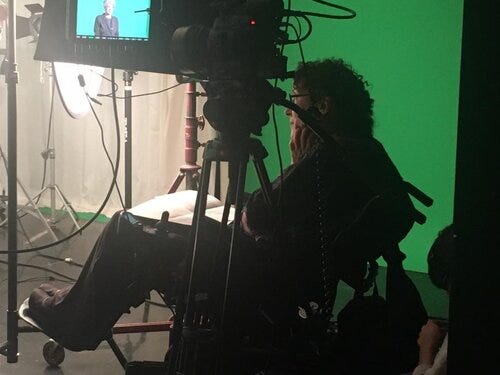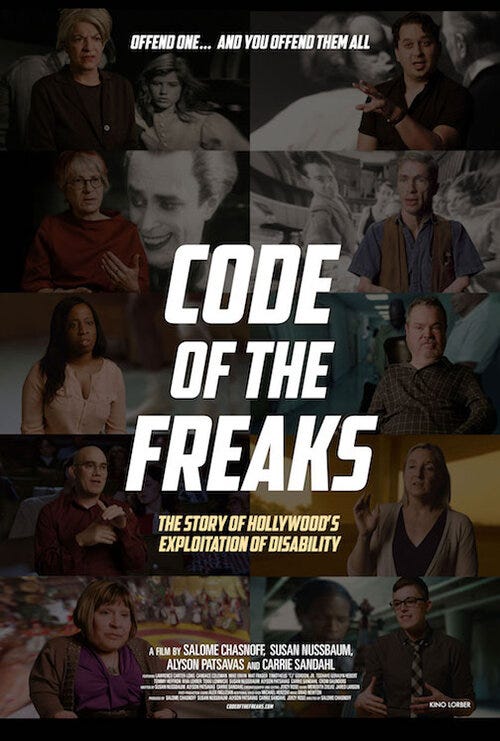Filmmakers Salome Chasnoff and Susan Nussbaum on 'Code of the Freaks' and the Importance of Watching Movies with a "Piercing Gaze"
A Q&A, plus more
Dear moviegoers,
It’s now the second week of March 2021. WandaVision wrapped up on Disney+ last week, and Zack Snyder’s Justice League comes to HBO MAX next week. We’re in the eye of a fandom storm right now, one that tends to push out other films and programs from being covered.
Coming soon, I’m going to begin a streaming picks column, where I’ll find two films from one platform that are more than worth the price of a subscription. Underseen, less known, and never considered - let’s check them out.
For today’s newsletter, I offer up the following:
A movie watchlist
Links (to read & watch)
Q&A with Director Salome Chasnoff and Writer Susan Nussbaum (Code of the Freaks)
For your approval of course. Should you enjoy, do consider sharing, signing up, and subscribing.
Should you disapprove, feel free to tweet at me anytime.
:)
Watchlist
This past weekend, our Senate passed The American Rescue Plan Act of 2021, without a single Republican vote. For those GOP Senators, I have a selection of films for recommended viewing with their constituents:
The Florida Project (families shouldn’t have to be pushed into living out of a dingy motel, especially near the “happiest place on Earth.”)
City Lights (Chaplin’s beautiful romance picture is also an example of a failed society, in how the poor must struggle and fight on their own, for their own)
Capitalism: A Love Story (granted, no Republican would show up for this one, but maybe if we advertised a false showing of a Kevin Sorbo movie… )
Elysium (it’s silly and on the nose, but rings true in many ways - especially at its most ridiculous)
Parasite (a class system like this - or at all - shouldn’t be)
What would you pick?
Links (to read & watch)
“I’m really haunted in my dreams by guilt and by people returning from the dead. I really love those dreams.”
On Leslie Epstein’s book Hill of Beans
“He wants to be the knight in shining armor. It’s a commendable instinct. But Ford’s film illustrates why his noble intentions are all wrong.”
Can Film TikTok Save Film?
Q&A with Director Salome Chasnoff and Writer Susan Nussbaum of Code of the Freaks
Q: One of the last pieces of criticism offered by the guests in Code of the Freaks is that no film has completely gotten disability representation right. For you, are there films that have come close?

Salome: Some wonderful films have come out since Code of the Freaks was in post-production. Crip Camp, a documentary, offers a glorious, loving history of crip activism. Chained for Life – not the 1952 film about the conjoined twin who kills her husband but the 2019 film about the actress who struggles to bond with her disabled co-star – is a completely original film, bizarre, funny, full of feeling, and a powerful challenge to the norms of representation.

Susan: I liked A Quiet Place, a sci-fi film about a family including a Deaf daughter (played by a terrific Deaf actor,) that must defend itself against an invasion of aliens whose main survival skill is their highly developed sense of hearing. Just a really good movie that I liked a lot. The Sound of Metal was also an ingenious story about a drummer with a heavy metal band (a low-key yet dynamite Riz Ahmed) who suddenly loses his hearing and pins his hopes for “recovery” on cochlear implant surgery. While awaiting the procedure, he stays at a sort of deaf rehabilitation place run by Paul Raci (a wonderful actor who grew up with a foot in both the Deaf and hearing worlds.) The film defies every previous Deaf or disability-themed film by refusing to become mired in some treacly inspirational plotline. It succeeds on many levels that I don’t want to spoil except to say, you’ve never seen this movie before.
Q: What were some of your favorite statements and responses by the interview subjects?
Salome: I loved how several interviewees ponder the meaning of the film’s title in relation to their lived experience of crip community. No one statement tells the whole story; but together, they combine to give a rich picture. I also appreciated the discussion of The Sessions. Alyson Patsavas observes that in adapting Mark O’Brien’s short story for the screen, the plot is changed in several important ways. Like his queerness and his desire for kink are erased, and the relationship with his therapist gets written as a heterosexual romance because disabled desire can’t exist on its own, outside of heterosexual romance. Riva Lehrer further notes how in movies having sex with a disabled person is, at some level, an act of charity. There are so many ways in which Hollywood gets disability wrong, but sex is on the top of the heap.
Susan: I appreciated Mike Ervin’s thoughts about comedy. Tekki Lomnicki’s fantasies about a movie she’d like to see were a riot and there were several really important comments from a few people on the very rare and mostly crappy sex scenes involving disabled characters. The sheer absence of sexuality from depictions of disabled characters is infuriating. I think the interviews as a whole worked to open the eyes of viewers, both disabled and non-disabled, who previously never understood the extent to which they’ve been brainwashed about our real (disabled) lives.
Q: When it comes to disability representation, what is your preferred method of presentation?
Salome: The focus is always on who is playing the role; are they disabled? We need to look at the whole picture: the writing, the directing, the cinematography, the editing – everything that comes together to tell the story. Because until we see stories that are nuanced, that run the gamut of disability experience, it doesn’t matter who’s playing the role. So, I don’t have a preferred method of presentation. I value whatever is truthful, humanizing, engaging, and well done. I love when people go out on a limb to tell a unique story.
Susan: Since maybe 97% of disability-themed films are written, performed, directed, and produced by non-disabled people, I think changing some or most of those factors would be a good start. I’m not saying all disability-themed movies are garbage, but they’re all problematic in many or at least a few ways. I think one can possibly understand better when looking at the revolution in race-themed films. Compare the racist stock characters dusted off and thrown onscreen for so long. Only until Black artists were able to take control of the process did the films become really mind-blowing.
Q: What challenges if any did you experience in the making of this film?
Salome: We encountered two main challenges: money and money. I say two rather than one because raising the money was hard; but in addition, potential funders who might have supported the film told us they didn’t appreciate our snarky, community-driven approach. They wanted to see an inspirational hero’s journey, exactly what we were deconstructing. Our message is that we’re in this together and there’s nothing inspiring about it. Ultimately, our community made the film possible; we raised the entire budget through crowdfunding.
Susan: I agree with Salome.
Q: There’s mention in the documentary of how critics and audiences should develop a “piercing gaze” for film. I’ve always felt that no movie is merely a popcorn movie. Have moviegoers been conditioned to think against thinking? If so, what effects on discourse have you witnessed?
Salome: Everyday life is harder than ever, and people understandably look for escape. I know I do. But I find that audiences are becoming more critical and they are demanding better films, especially young people. I’m an academic as well as an artist so I may not be the best person to ask about this. That said, it seems that when it comes to disability representation, viewers are addicted to the inspirational narrative. It’s like a drug. It just feels so good. And they can’t see what’s wrong with it no matter how many different ways I try to explain it.
Susan: I think the movies teach people how to think. Like pop music, all the songs sound similar but when one comes on the radio you feel like singing along and you know all the words. And the backup. In the case of disability-themed films, they are so formulaic that they resemble, and imitate each other. Your brain knows exactly what’s coming. You’ve got the able-bodied best friend character teaching disabled characters to “get over themselves” scene. You have the gimpy bride walking down the aisle with the able-bodied guests crying with joy scene. The cure scene, the sad but brave death scene, the overcoming scene – it’s the cheapest of cheap thrills. We’re all a part of Pavlov’s experiment. I caught myself being sucked into a movie recently I really liked until I realized that it had pressed all my buttons. It was based on a book I liked a lot and had great actors in it. And a great soundtrack. I was so ashamed of myself. Of all people, I should know better. Doesn’t mean you hate the movie, just means you’re onto the movie.
(Here’s a list of resources for those wanting to learn more about disability representation)
Based out of “Hollywood South” New Orleans, Bill Arceneaux has written about movies and moviegoing for publications like Big Easy Magazine, Film Threat, Bayou Brief, Occupy, and others since 2011. A member of the Southeastern Film Critics Association and Rotten Tomatoes approved, his favorite films range from APOCALYPSE NOW to ROMAN HOLIDAY, depending on which way the wind blows. Find out about his latest exploits on Twitter at @BillReviews,




